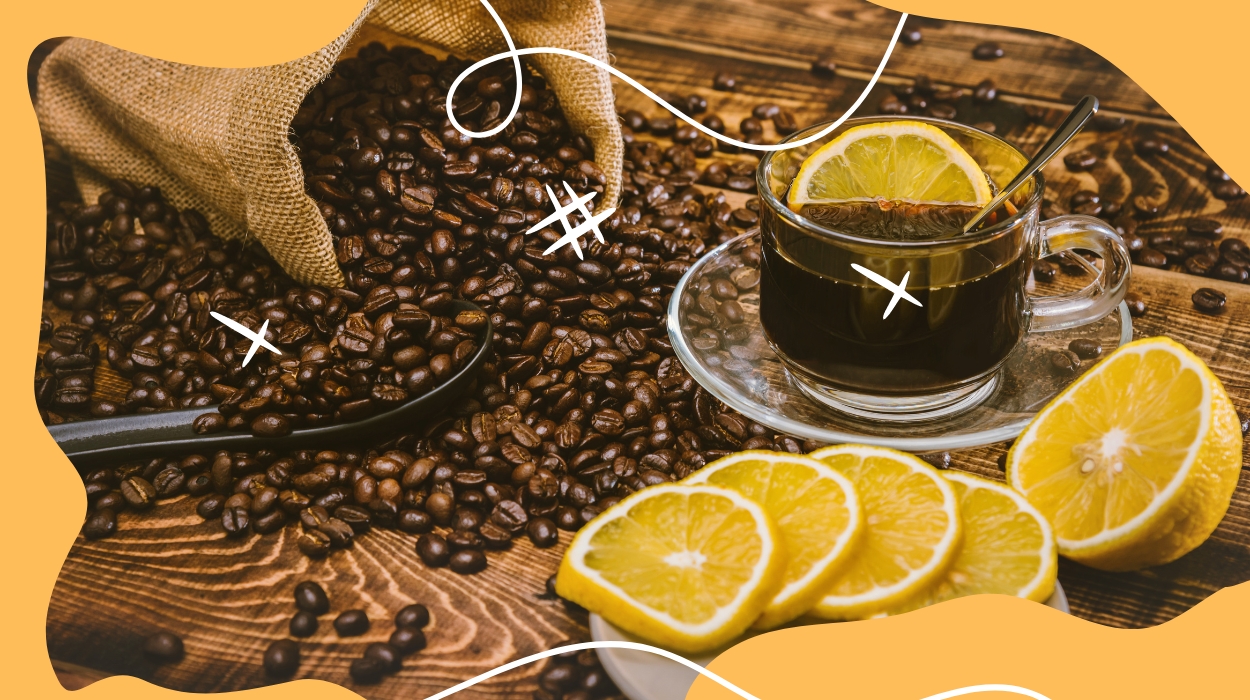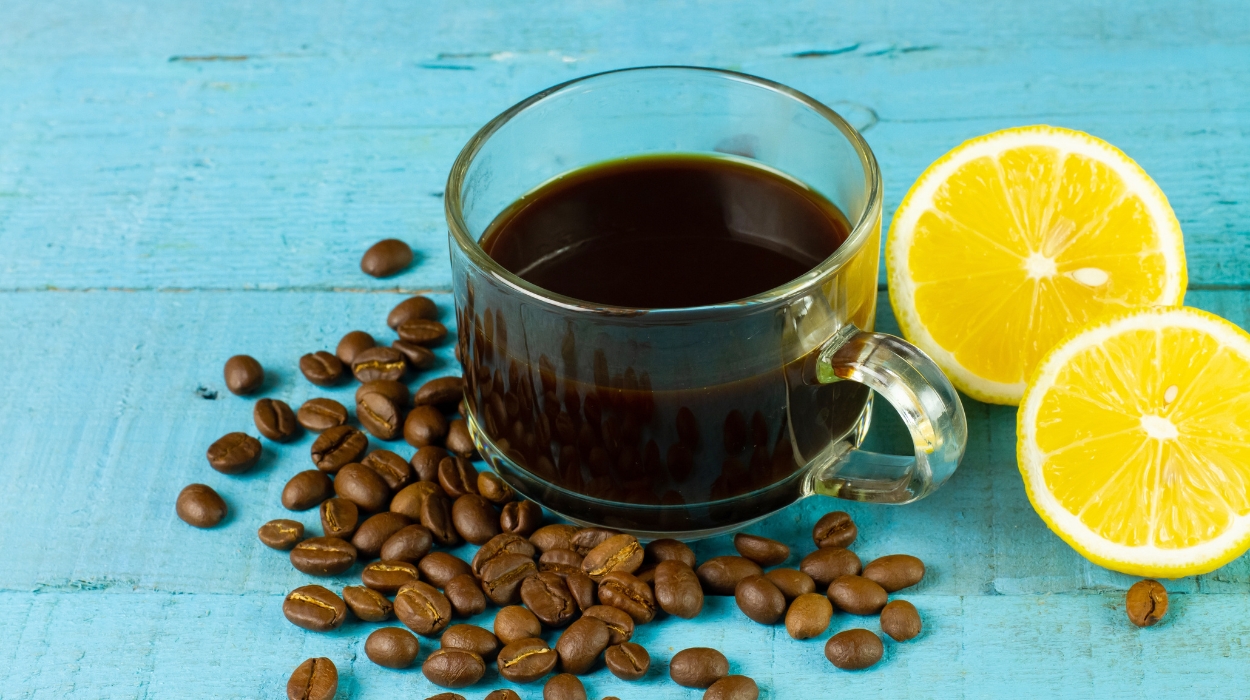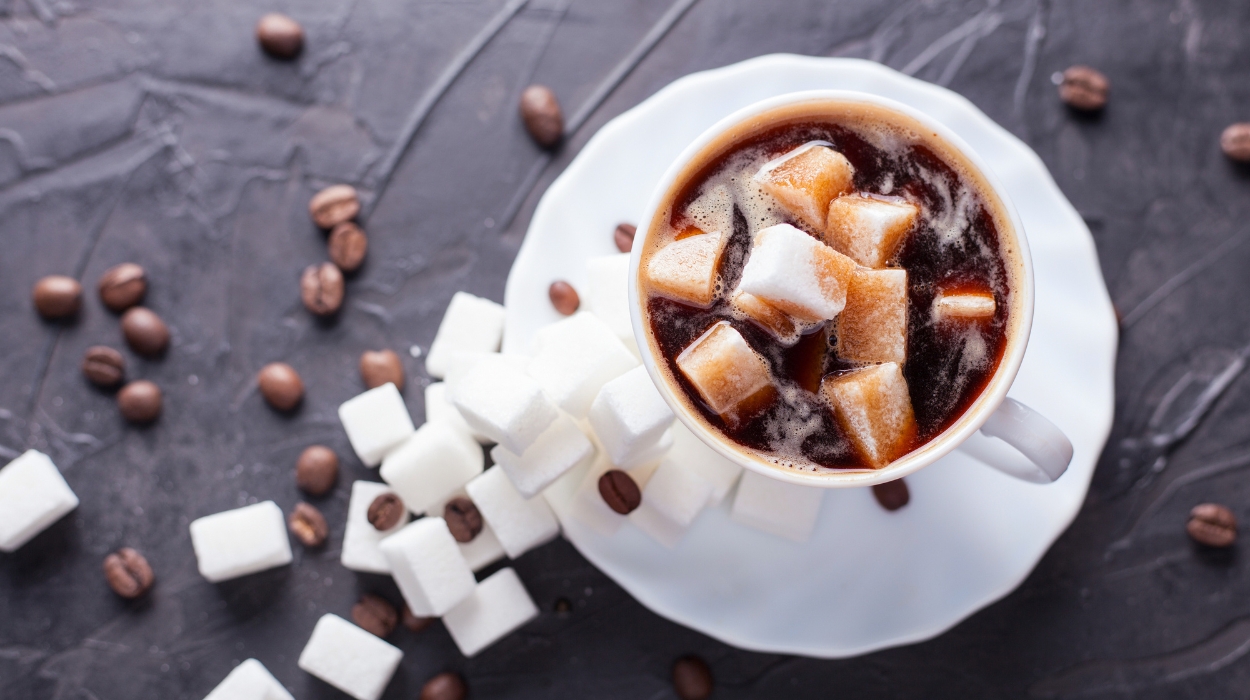 Expert's opinion
Expert's opinion
Expert's opinion
The article is a subjective view on this topic written by writers specializing in medical writing.
It may reflect on a personal journey surrounding struggles with an illness or medical condition, involve product comparisons, diet considerations, or other health-related opinions.
Although the view is entirely that of the writer, it is based on academic experiences and scientific research they have conducted; it is fact-checked by a team of degreed medical experts, and validated by sources attached to the article.
The numbers in parenthesis (1,2,3) will take you to clickable links to related scientific papers.
Coffee And Lemon For Weight Loss: Does This New TikTok Trend Work 2024?

Have you come across the new trend among TikTok users of drinking coffee with lemon to lose weight?
Well, it’s taking the world by storm as many more people try out the ‘magic’ combination. The increase in popularity is wanting, so it’s best to find out if you can achieve weight loss this way. There’s a lot of confusion surrounding the lemon coffee myth.
In this article, we get to explore what science has to say about the coffee-lemon drink. Can a combination of the two help lose weight, or is it all hype? What are the effects of consuming lots of lemon coffee? Are there better ways to promote natural fat-burning?
Coffee And Lemon For Weight Loss: Does It Work?
A new TikTok trend encourages taking coffee-lemon drinks for weight loss. But, is this a good idea? The notion is to mix a cup of coffee with fresh juice from one lemon cut into slices and drink it. While the two drinks have their benefits, it’s not accurate that a mixture can help you shed weight.
Lemon juice and coffee can’t melt your body fat. Even when you take the simple drinks individually, the results are the same. There are better ways to shed excess weight, like eating fewer calories.[1]
Many homes have both coffee and lemon juice at hand for different uses. You get coffee by brewing roasted coffee beans. For many people, having a cup of morning coffee is a necessity. The main reason for the high intake is that coffee has caffeine content.
Caffeine[2] is a stimulant that impacts your central nervous system and general mood. It helps you focus better and be more alert once it kicks in.
Many people like lemon juice because it’s a great source of vitamin C and citric acid.
Besides, a lemon slice has antioxidant properties that help the body tackle free radicals.[3] For centuries, people have used lemon for all sorts of medicinal purposes. Since lemons and coffee are quite popular today, it’s not a surprise they’re currently trending. But, drinking coffee with lemon that has lots of vitamin C isn’t a way to support weight loss.
Experts Talk About The Trend
Experts have a bit to say about the lemon coffee[4] TikTok weight loss trend that’s now quite popular. Erin Palinski-Wade, a registered dietitian, said, “Adding lemon into coffee will not promote weight loss, just like drinking lemon water has little impact on body weight.”
Michelle Rauch, a registered dietitian at The Actors Fund Home, also stated, “The idea that combining coffee and lemon juice creates a ‘fat burning’ elixir is false. While each component may have its own health benefits, there is no scientific evidence to prove that pairing the two would promote weight loss.”
Does Coffee Help You Lose Weight?
Still, there is evidence that drinking coffee can help you lose a little weight. It’s because caffeine exposure[5] can induce browning features in adipose tissue. The BAT (Brown Adipose Tissue) can generate lots of heat at a higher rate. Once this happens, it metabolizes macronutrients like lipids and glucose in the body. This is the reason that caffeine is included in most fat-burning supplements.
Some studies also show that caffeine can increase your metabolic rate. When this takes place, you can burn more calories which benefits your body’s goal of losing weight.[6] However, this only happens slightly, so finding other ways to aid weight loss is better.
Lemon coffee isn’t a guarantee that you’ll lose weight. Some people believe that it can help you eat less. This is through appetite suppression since it promotes satiety. However, science[7] suggests no link between taking coffee and body mass index (BMI).
So, it’s better to steer clear of lemon coffee drinks with vitamin C for weight loss, as suggested by TikTok users. You might end up taking too much of the drink, which has side effects on the body like:
- Nervousness
- High blood pressure
- Nausea
- Shakiness
- Dehydration
- Dizziness
- Abnormal heart rhythm
Does Lemon Water Help You Lose Weight?
Lemon is an excellent fruit that serves so many roles at home. Lemon juice can give you citric acid plus vitamin C, which are needed nutrients. That’s why many people chose it as the fruit of choice to make different simple drinks and dishes. Some even include herbs and spices like cinnamon in their recipes.
However, there’s been a TikTok trend of taking lemon water to lose weight for a long time. But is this true? Can squeezing lemon juice into a glass of water each morning be a good way to lose weight?
Frankly, lemon water is quite healthy because it contains a calorie deficit. It means when you start your morning with a glass of lemon water, you kick start your metabolism by taking in this beverage as opposed to a high-calorie drink. For this reason, lemon water can help you lose weight.[8]
But, remember, you can’t live on lemon water alone. If you choose to take it in the morning, you have to follow this with a healthy, low-calorie breakfast. Drinking lemon water alone isn’t a solution for weight loss despite it having citric acid.
Water is good for your metabolism and digestion since your body has better hydration.[9] Plus, a glass of lemon juice leaves you feeling full. Therefore, you’re more inclined to eat less food because of the satiety effect of the lemon water.
Better hydration induces thermogenesis,[10] a metabolic process that will promote natural fat burning. Still, there’s limited research proving lemon juice can help you lose weight. It’s better to combine it with healthy meals and physical activity.
What Makes Lemon Coffee A Sham?

The way a TikTok fake video thrives is by creating a trend. It’s easy to create this when you have an issue that many people face. For instance, billions of people want to lose weight globally. The majority of them will try any coffee-lemon challenge that promises results.
But, lemon coffee is a TikTok trend that will leave many disappointed. This is quite evident after checking the facts about coffee-lemon water. While the two drinks can boost metabolism, they can’t melt the fat[11] in your body.
Also, it’s worth noting the side effects of drinking too much coffee. You might end up with a bad case of insomnia. Caffeine intake all day long keeps you alert.[12] It means you might find yourself battling insomnia.
This does not mean that coffee and lemon are bad. These two drinks are quite healthy and have loads of benefits[13] that improve your quality of life. However, it’s not true that drinking lemon coffee every day will give you your dream body.
Achieving your dream physique is only possible with physical activity,[14] better eating habits,[15] and healthy foods. You can drink coffee and lemon water in addition to this and develop a fantastic weight loss plan.[16] Just ensure you speak with a doctor. Also, ensure you take fewer amounts since too much lemon consumption can affect your tooth enamel.
Things You Should Never Add To Coffee
Coffee is a popular drink of choice for many. In fact, by September 2021, global coffee exports were 10.07 million bags. However, not everyone is a fan of drinking black coffee. You might prefer to add a few ingredients to make it taste and smell better.
However, it’s worth being cautious about what you add to your black coffee. Not all ingredients are healthy, which can affect your weight loss journey. Some of the ingredients to avoid adding to your cup of coffee are:
Room-temperature Creamers
Any person seeking to live a healthier lifestyle has to steer clear of creamers. While they look appealing, they aren’t the best for your body. Those who make these creamers add synthetic additives to increase their shelf life.
These additives aren’t good for your overall health and well-being. Studies[17] show that they contribute to ailments such as heart disease. These aren’t real food and are bad for your nutrition.
Syrups
The worst thing about most flavored syrups for black coffee in the market is the sugar content. Most of these coffee syrups contain upwards of 50 grams of sugar which isn’t good for your health.[18]
Condensed Milk
Have you ever come across a Spanish coffee with condensed milk as part of the ingredients? Is this your favorite brew? Well, it might be time to check out a different coffee that’s healthier.
Condensed milk is bad for you[19] because it has a high caloric content. Some producers even go further and add artificial flavoring to make it sweet.
Sugar

Sugar isn’t healthy. However, many people are guilty of adding it to their cup of coffee. It makes the simple drink more palatable and refreshing. However, it’s worth noting that sugar isn’t your friend[20] as you try to burn belly fat.
Having the coffee and lemon combo isn’t a solution for weight loss. TikTok users in their fake videos might swear by this trend, but this is far from the truth. It’s better to stick to your regular cup of coffee and not add even spices like cinnamon in it.
Apart from this, there are other weight loss myths you might not hear about worth looking into.
Other Weight Loss Myths You Might Not Hear
The coffee lemon drink isn’t the only myth surrounding weight loss journeys. Some others you might not hear about include:
- No carbs are the only way to lose weight
- Aloe vera juice will help you lose weight
- Lots of smoothies will help you lose weight
These myths will only land you into problems regarding weight loss. However, when you want to shed extra pounds, there are better ways to do so safely.
How To Lose Weight Safely
Curbing Carbs
A low-carb meal can work wonders for you when you want to lose weight.[21] Carbs supply you with glucose which it needs to burn as energy. However, excess amounts are stored as fat. One way to avoid storing more fat is to lower your carbohydrate intake with each meal.
Lift Weights
The best way to burn excess fat is to boost metabolism. Research shows that lifting weights[22] can help your body achieve a higher metabolic rate, which helps you melt fat.
Vegetable Juice
Vegetable juice is quite healthy[23] because it contains less sugar. Unlike fruit juices, the low sugar content is excellent for anyone who wants to shed extra fat. Plus it helps promote satiety.
Supplements
Weight loss pills are another popular trend across the world that can help you lose weight. Combining the supplements[24] with other solutions, you can eat less and work out more.
Green Tea
Green tea is a healthy drink[25] that can increase fat burning in the human body. The drink isn’t too tasty. But, it aids the body in breaking down the stored fat before burning commences.
Summary
TikTok users continue to hype lemon coffee as the number one way to lose weight fast. Some even phrase it as the lemon challenge and hype the fact that it has citric acid.
But, research shows that this isn’t the case. It’s better to go with proven ways to shed extra pounds. These include curbing carbs, lifting weights, vegetable juice, weight loss supplements, and green tea. Still, speak with your doctor before coming up with any weight loss plan.
Frequently Asked Questions
No, there’s no scientific evidence that shows adding lemon to black coffee will help you achieve weight loss. In fact, drinking lots of this combination can be dangerous for your health.
Lemon water is excellent to have in the morning to lose belly fat. This is a low-calorie drink that also encourages metabolism.
You can have many drinks when losing weight is on your mind. Among the top picks is green tea. The drink contains lots of healthy compounds and boosts metabolism in the body.
+ 25 sources
Health Canal avoids using tertiary references. We have strict sourcing guidelines and rely on peer-reviewed studies, academic researches from medical associations and institutions. To ensure the accuracy of articles in Health Canal, you can read more about the editorial process here
- Finer, N. (2001). Low-Calorie Diets and Sustained Weight Loss. [online] 9(S11), pp.290S294S. doi:https://doi.org/10.1038/oby.2001.133.
- Cappelletti, S., Piacentino, D., Sani, G. and Mariarosaria Aromatario (2015). Caffeine: Cognitive and Physical Performance Enhancer or Psychoactive Drug? [online] 13(1), pp.71–88. doi:https://doi.org/10.2174/1570159×13666141210215655.
- Rahman, K. (2007). Studies on free radicals, antioxidants, and co-factors. Clinical interventions in aging, [online] 2(2), pp.219–36. Available at: https://www.ncbi.nlm.nih.gov/pmc/articles/PMC2684512/.
- Moore, C. (2021). ‘Lemon coffee’ trend on TikTok shouldn’t be done, health experts say. [online] Fox News. Available at: https://www.foxnews.com/lifestyle/lemon-coffee-trend-tiktok-health-experts-talk.
- Ksenija Velickovic, Wayne, D., Anaid, H., Bloor, I., Morris, D.L., Law, J., Budge, H., Sacks, H.S., Symonds, M.E. and Sottile, V. (2019). Caffeine exposure induces browning features in adipose tissue in vitro and in vivo. [online] 9(1). doi:https://doi.org/10.1038/s41598-019-45540-1.
- Koot, P. and Deurenberg, P. (1995). Comparison of Changes in Energy Expenditure and Body Temperatures after Caffeine Consumption. [online] 39(3), pp.135–142. doi:https://doi.org/10.1159/000177854.
- Leah Panek-Shirley Ph.D, DeNysschen, C.A., Eoin O’Brien and Temple, J.L. (2018). Caffeine Transiently Affects Food Intake at Breakfast. [online] 118(10), pp.1832–1843. doi:https://doi.org/10.1016/j.jand.2018.05.015.
- Fukuchi, Y., Masanori Hiramitsu, Okada, M., Hayashi, S., Yuka Nabeno, Osawa, T. and Naito, M. (2008). Lemon Polyphenols Suppress Diet-induced Obesity by Up-Regulation of mRNA Levels of the Enzymes Involved in β-Oxidation in Mouse White Adipose Tissue. [online] 43(3), pp.201–209. doi:https://doi.org/10.3164/jcbn.2008066.
- Thornton, S.N. (2016). Increased Hydration Can Be Associated with Weight Loss. [online] 3. doi:https://doi.org/10.3389/fnut.2016.00018.
- Boschmann, M., Steiniger, J., Hille, U., Tank, J., Adams, F., Sharma, A.M., Klaus, S., Luft, F.C. and Jordan, J. (2003). Water-Induced Thermogenesis. [online] 88(12), pp.6015–6019. doi:https://doi.org/10.1210/jc.2003-030780.
- Gavrieli, A., Yannakoulia, M., Fragopoulou, E., Dimitris Margaritopoulos, Chamberland, J.P., Panagiota Kaisari, Kavouras, S.A. and Mantzoros, C.S. (2011). Caffeinated Coffee Does Not Acutely Affect Energy Intake, Appetite, or Inflammation but Prevents Serum Cortisol Concentrations from Falling in Healthy Men1–4. [online] 141(4), pp.703–707. doi:https://doi.org/10.3945/jn.110.137323.
- Drake, C.L., Roehrs, T., Shambroom, J.R. and Roth, T. (2013). Caffeine Effects on Sleep Taken 0, 3, or 6 Hours before Going to Bed. [online] 09(11), pp.1195–1200. doi:https://doi.org/10.5664/jcsm.3170.
- Shimizu, C., Wakita, Y., Inoue, T., Masanori Hiramitsu, Okada, M., Mitani, Y., Segawa, S., Tsuchiya, Y. and Toshitaka Nabeshima (2019). Effects of lifelong intake of lemon polyphenols on aging and intestinal microbiome in the senescence-accelerated mouse prone 1 (SAMP1). [online] 9(1). doi:https://doi.org/10.1038/s41598-019-40253-x.
- Swift, D.L., Johannsen, N.M., Lavie, C.J., Earnest, C.P. and Church, T.S. (2014). The Role of Exercise and Physical Activity in Weight Loss and Maintenance. [online] 56(4), pp.441–447. doi:https://doi.org/10.1016/j.pcad.2013.09.012.
- US), M. (2023). Weight-Loss and Maintenance Strategies. [online] Nih.gov. Available at: https://www.ncbi.nlm.nih.gov/books/NBK221839/.
- Soeliman, F.A. and Azadbakht, L. (2014). Weight loss maintenance: A review on dietary related strategies. Journal of research in medical sciences : the official journal of Isfahan University of Medical Sciences, [online] 19(3), pp.268–75. Available at: https://www.ncbi.nlm.nih.gov/pmc/articles/PMC4061651/.
- Chung, C., Sher, A., Rousset, P. and David Julian McClements (2017). Influence of homogenization on physical properties of model coffee creamers stabilized by quillaja saponin. [online] 99, pp.770–777. doi:https://doi.org/10.1016/j.foodres.2017.06.060.
- Paglia, L. (2019). The sweet danger of added sugars. [online] 20(2), pp.89–89. doi:https://doi.org/10.23804/ejpd.2019.20.02.01.
- Rice, F.L. (1929). Evaporated Milk and Its Relation to Public Health. [online] 19(7), pp.777–781. doi:https://doi.org/10.2105/ajph.19.7.777.
- Rippe, J.M. and Angelopoulos, T.J. (2016). Relationship between Added Sugars Consumption and Chronic Disease Risk Factors: Current Understanding. [online] 8(11), pp.697–697. doi:https://doi.org/10.3390/nu8110697.
- Oh, R., Gilani, B. and Uppaluri, K.R. (2023). Low Carbohydrate Diet. [online] Nih.gov. Available at: https://www.ncbi.nlm.nih.gov/books/NBK537084/.
- Willis, L.H., Slentz, C.A., Bateman, L.A., A. Tamlyn Shields, Piner, L.W., Bales, C.W., Houmard, J.A. and Kraus, W.E. (2012). Effects of aerobic and/or resistance training on body mass and fat mass in overweight or obese adults. [online] 113(12), pp.1831–1837. doi:https://doi.org/10.1152/japplphysiol.01370.2011.
- Zheng, J., Zhou, Y., Li, S., Zhang, P., Zhou, T., Xu, D. and Li, H. (2017). Effects and Mechanisms of Fruit and Vegetable Juices on Cardiovascular Diseases. [online] 18(3), pp.555–555. doi:https://doi.org/10.3390/ijms18030555.
- Nih.gov. (2013). Office of Dietary Supplements – Dietary Supplements for Weight Loss. [online] Available at: https://ods.od.nih.gov/factsheets/WeightLoss-HealthProfessional/.
- Lu, H., Meng, X. and Yang, C.S. (2003). Enzymology of Methylation of Tea Catechins and Inhibition of Catechol-O-methyltransferase by (−)-Epigallocatechin Gallate. [online] 31(5), pp.572–579. doi:https://doi.org/10.1124/dmd.31.5.572.



